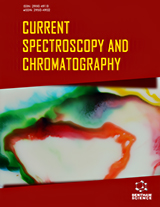Abstract
Background: Aluminum Al(III) is the most significant metal in the earth's crust to which humans are frequently exposed and has several industrial applications. On the other hand, Al (III) has high potential toxic impacts on some human pathologies like Parkinson and Alzheimer's disease. So, it is very important to monitor and determine the trace level of Al (III) in various environmental and biological samples.
Objective: In the present work, a novel green supramolecular Solvent-Based Liquid-Phase Microextraction (SS-LPME) procedure has been developed to preconcentrate and determine aluminum (III) in various real samples.
Methods: The proposed procedure was based on the application of 1-decanol/THF as a Supramolecular Solvent (SS) system and quinalizarin as a chelating agent. Al(III)-quinalizarin hydrophobic complex was obtained at pH 7.0, extracted into supramolecular solvent phase (1- decanol/THF), centrifuged and then measured spectrophotometrically at 580 nm. The impact of different analytical parameters on the microextraction efficiency was studied and optimized. The validation of the proposed preconcentration procedure was checked using certified reference materials.
Results: The calibration curve was linear in the range of 2.0-150 μg L-1. The developed method has preconcentration factor of 40 and detection limit (LOD) was 0.20 μg L-1. The precision of the method was confirmed with low relative standard deviation (RSD ≤ 1.0%).
Conclusion: This study explores the effectiveness of quinalizarin for the first time together with SS to develop green SS-LPME method to preconcentrate and separate trace quantities of Al (III) in real water, fruit juice, food, hair, and urine samples collected from Saudi Arabia.
Keywords: Aluminum(III), food, fruit juice, hair and biological samples, quinalizarin, spectrophotometry, supramolecular solvent microextraction, water.
Graphical Abstract
[http://dx.doi.org/10.1007/s00604-011-0667-3]
[http://dx.doi.org/10.1016/j.etap.2016.03.017] [PMID: 27037653]
[http://dx.doi.org/10.1016/j.saa.2014.08.068]
[http://dx.doi.org/10.1248/cpb.56.475] [PMID: 18379093]
[http://dx.doi.org/10.1016/j.sab.2006.12.005]
[http://dx.doi.org/10.1016/j.talanta.2005.04.002] [PMID: 18970238]
[http://dx.doi.org/10.1039/C5RA10046A]
[http://dx.doi.org/10.1016/j.talanta.2017.09.079] [PMID: 29136867]
[http://dx.doi.org/10.15171/PS.2016.15]
[http://dx.doi.org/10.1016/j.jhazmat.2010.02.006] [PMID: 20189303]
[http://dx.doi.org/10.1016/j.jhazmat.2007.11.018] [PMID: 18082326]
[http://dx.doi.org/10.1016/j.jhazmat.2009.11.121] [PMID: 20006436]
[http://dx.doi.org/10.1039/b9ay00293f]
[http://dx.doi.org/10.1016/j.jhazmat.2009.07.064] [PMID: 19665295]
[http://dx.doi.org/10.1016/j.microc.2011.03.013]
[http://dx.doi.org/10.1007/s12011-011-9070-5] [PMID: 21573872]
[http://dx.doi.org/10.1016/j.talanta.2009.06.055] [PMID: 19782206]
[http://dx.doi.org/10.1016/j.desal.2011.07.063]
[http://dx.doi.org/10.1080/03067310903276266]
[http://dx.doi.org/10.1016/j.talanta.2003.11.005] [PMID: 18969448]
[http://dx.doi.org/10.1016/j.microc.2015.04.013]
[http://dx.doi.org/10.1016/j.jfca.2013.10.002]
[http://dx.doi.org/10.1016/j.jhazmat.2010.06.034] [PMID: 20619964]
[PMID: 29201091]
[http://dx.doi.org/10.1016/j.talanta.2007.12.047] [PMID: 18585167]
[http://dx.doi.org/10.1080/00032710701606366]
[http://dx.doi.org/10.1080/03067319.2016.1253690]
[http://dx.doi.org/10.1016/j.foodchem.2015.11.042] [PMID: 26617013]
[http://dx.doi.org/10.1080/03067319.2015.1090568]
[http://dx.doi.org/10.1039/C4RA17116K]
[http://dx.doi.org/10.1016/j.talanta.2014.03.053] [PMID: 24881552]
[http://dx.doi.org/10.1016/j.saa.2014.04.075] [PMID: 24825667]
[http://dx.doi.org/10.1080/03067319.2014.930846]
[http://dx.doi.org/10.1016/j.chroma.2008.06.029] [PMID: 18603255]




























